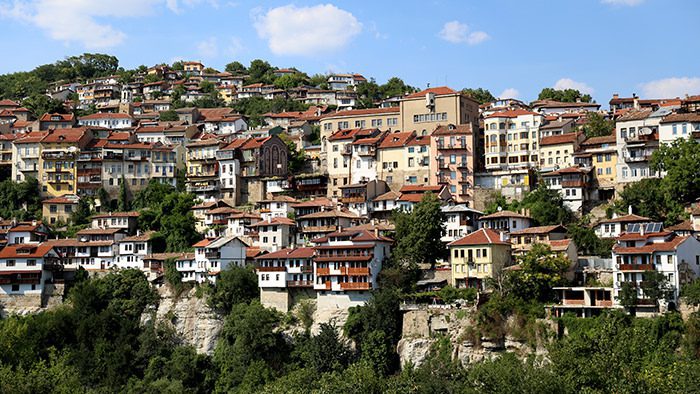
As one of the oldest cities in Bulgaria, Veliko Tarnovo is steeped in five thousand years of history. This small, picturesque city is home to one of Europe’s grandest medieval monuments, the Tsaravets Fortress.
If you have never been to Bulgaria before, this is certainly one of the country’s must-see destinations. What Veliko Tarnovo lacks in beach resorts and high-end shopping, it more than compensates in authenticity and beauty.
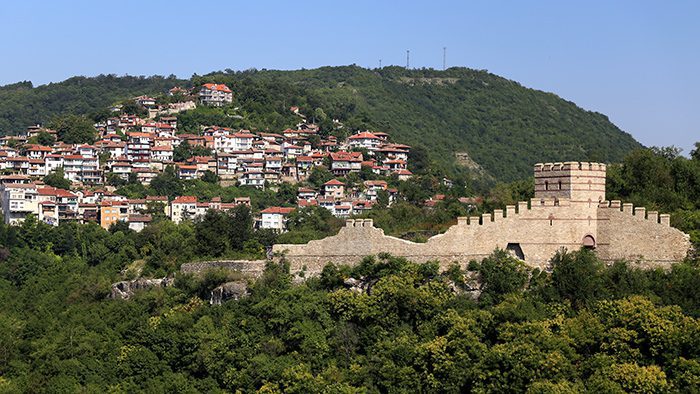
Veliko Tarnovo was built on three hills: Tsaravets, Trapezitsa, and Sveta Gora. Its attractive landscape has the Yantra River running through it. Brutally hot summers and freezing winters make spring and fall the best seasons to visit. Besides Tsaravets Fortress, Veliko Tarnovo contains orthodox churches, museums, and a charming old town paved with cobblestones.
While there aren’t enough sightseeing opportunities to hold you for more than a three to four days, Veliko Tarnovo fortunately has several good restaurants and hotel options. History buffs and wine enthusiasts will also have great day trip opportunities from the city. The nearby village of Arbanassi makes for the perfect tranquil weekend getaway. Other choices include trips to the ancient ruins of the Roman city Nikopolis ad Istrum and the quaint Maryan boutique winery.

It is fairly easy to get around Veliko Tarnovo; almost everything is in walking distance or a short taxi drive away. The city is serviced by several roads, a nearby airport, and is located just 142 miles from the capital city of Sofia.

Archaeological evidence suggests that people occupied the area as early as the third millennium B.C. The city was declared capital of the Second Bulgarian Empire in 1185 after two local aristocratic brothers, Ivan Assen and Theodor-Petar, led a two-year battle against the Byzantine Empire. At that time, the city was known as Turnovgrad. Under the Assen dynasty Turnovgrad developed at a fast pace, with the addition of the most significant structures during the 12th through 14th centuries. Among these is the Tsaravets Fortress. During this Golden Age of prosperity, over 30 monasteries sprung up on Sveta Gora Hill and the city becomes a famous monastery touring spot, economic and cultural hub.
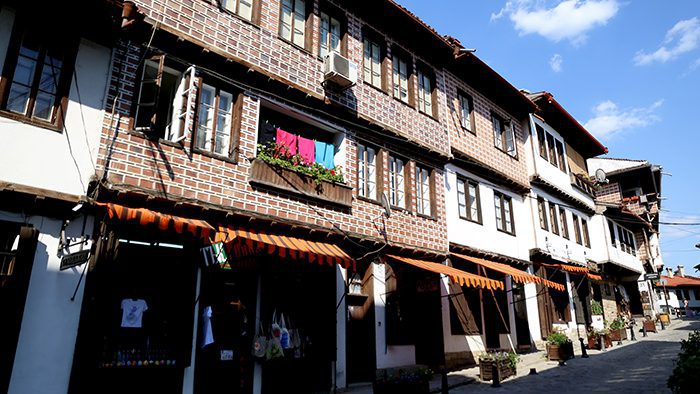
Along with the rest of the Balkans, Turnovgrad eventually fell into the hands of the Ottoman Turks in 1393, where it remained for nearly 500 years. Bulgaria was finally liberated in 1877 and Veliko Tarnovo became the capital city of the newly formed independent state. The title didn’t last long. Sofia was re-named the capital almost two years later. Turnovgrad was renamed Veliko Tarnovo in 1966.
Click here to watch our episode of the top things to see and do in Veliko Tarnovo

The best place to start is the Tourist Information Centre (ul. Hristo Botev 5 / +359 62 622 148) in the main square near the post office. It is open seven days a week April through October, and Monday through Friday November through March. Here you’ll have access to brochures, maps, postcards, and a staff of helpful locals who can answer any questions.

After getting the information you need, the first thing you should do is to go explore the highlight of the city, Tsaravets Fortress. The fortress is surrounded with 3,000 feet of stone walls, some of which have a thickness of over 11 feet and height of 36 feet. Once past the main gate, it is fairly easy to navigate the fortress on foot. There is a gentle incline and path, but visitors are essentially free to walk anywhere and climb anything they like.
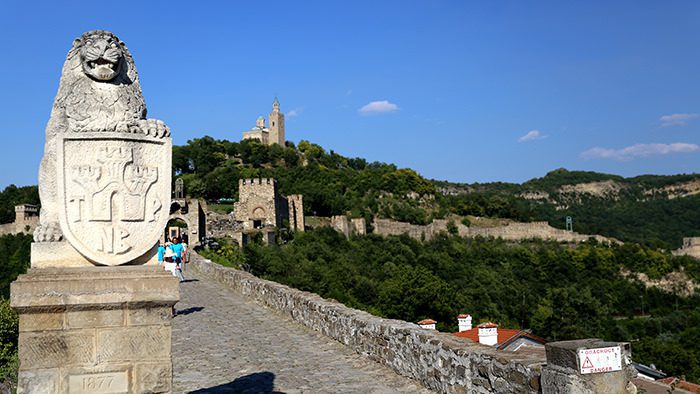
Head to the top of the hill if you want to see the dramatic modernist murals in the Church of the Ascension. For 2 BGN you can ride the scenic elevator to the top for panoramic views. Below the church, on a lower level, you’ll see Baldwin Tower. Legend has it that this is where Count Baldwin of Flanders was imprisoned by Tsar Kaloyan in the year 1205. Here there is a picnic area with a refreshment stand. There are also public toilets and plenty of shade from which to take a moment to admire the beautiful view of the town below.
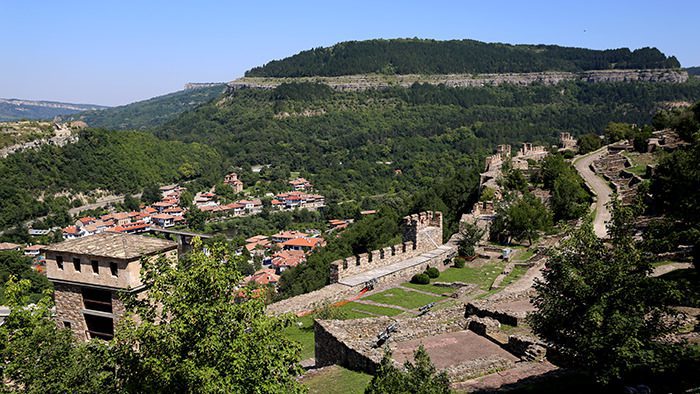
We advise exploring Tsaravets as early as possible to avoid the mid-day heat. The ticket office is located near the main entrance to the fortress. Tsaravets Fortress is open 8 a.m. – 7 p.m. April through October and 9 a.m. – 5 p.m. November through March.
Tip: Bring good walking shoes, a hat, and plenty of water.
On the evenings of bank holidays and Veliko Tarnovo Day (March 22), the city puts on an impressive sound and light show over the fortress. To see it you must either be on a terrace with a direct view of the fortress, or buy tickets to see the show from a designated viewing deck. The best place to get information about show dates is the Tourist Information Centre (see above for address).
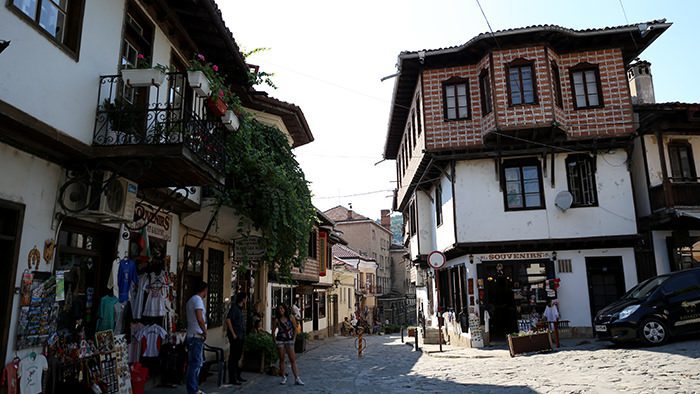
The Old Town is the perfect place for strolling, especially Samovodskata Charshia (Rakovski St.). During the second half of the 19th century, this was where artisans and farmers from the nearby village of Samovodene came on market days to sell their goods. In the 1980s the city revamped the area in an effort to recreate the atmosphere of the early 20th century. Samovodskata Charshia still contains several restored Revival buildings (the Bulgarian National Revival period was a cultural movement by Bulgarians to regain their identity from the Ottomans).
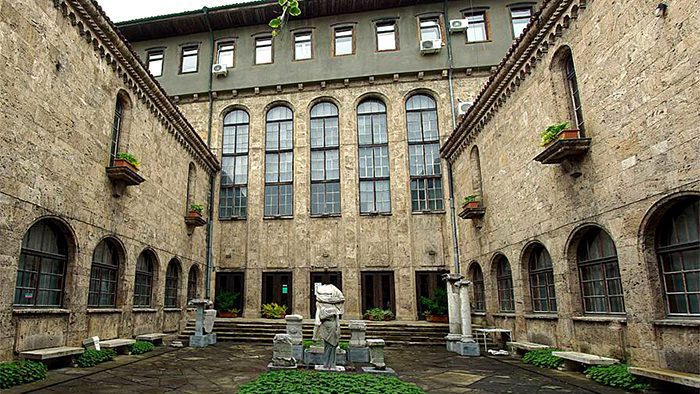
Amongst the city’s museums, the Archaeological Museum (ul. Ivanka Boteva 2) and the Hadji Nikoli Inn Museum (ul. Rakovski 19) are two worth seeing. The Archaeological Museum covers the region’s history from prehistoric times through the Middle Ages. The unquestionable highlight of the museum is one of the oldest gold treasures in the world dating back to the fourth millennium B.C. Like the one found near Varna, this treasure predates Egyptian and Sumerian civilizations!
The Hadji Nikoli Inn Museum is situated inside the 19th century home of wealthy local tradesman, Hadji Nikoli. It is a beautiful example of Bulgarian Revival architecture and the only surviving inn from that period. It is open Tuesday through Sunday 10 a.m. to 8 p.m. (closed Mondays). Admission is 5 BGN.
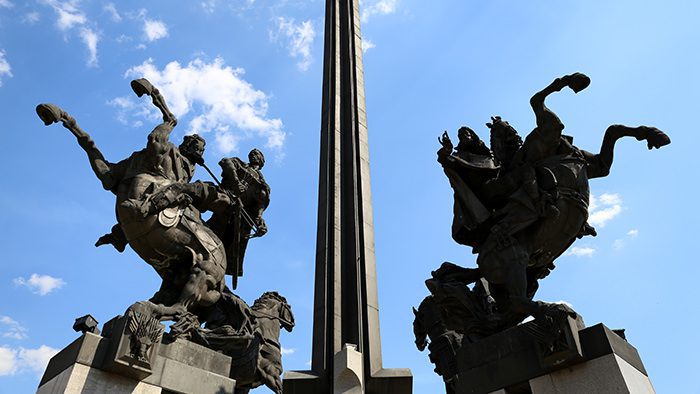
The Assens Monument can be seen from almost everywhere in the city. Nicknamed the “horsemen statue,” it features the Bulgarian Tsars, Ivan Assen, Theodor-Petar, Kaloyan, and Assen. The statue, which was erected exactly 800 years after the city was appointed capital of the Second Bulgarian Empire, commemorates the tsars for their contributions to the city. The steps leading up to the monument are frequently occupied by local art students using the scenic setting as inspiration for their work. From the monument you’ll enjoy beautiful views of the old town. You can access the monument on foot via the Stambolov Bridge.

In the river valley of Tsaravets Hill is the city’s most significant religious building. The Holy 40 Martyrs Church is about 20-minute walk from the old town. The church was erected in 1230 to commemorate an important victory over the Byzantines. It was also the location from which Prince Ferdinand I proclaimed the independence of Bulgaria from the Ottoman Empire on September 22, 1908. The church was badly damaged in an earthquake in 1913, but was restored in recent years. The church stores important historical records and the remains of several medieval tsars including Kaloyan, Ivan Assen I, and his wife Anna Maria.
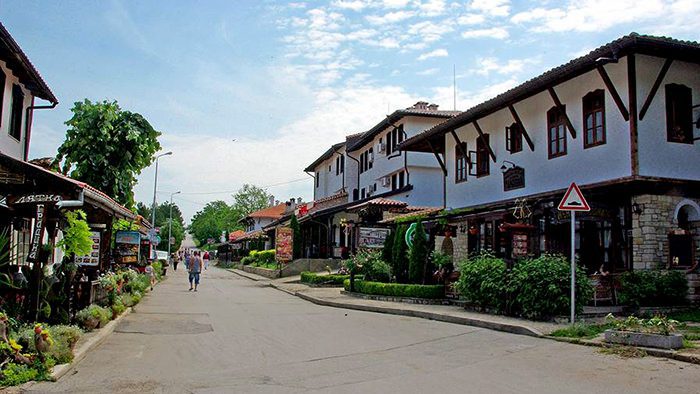
The town of Arbanassi is located about four kilometers uphill from Veliko Tarnovo. What was once a bustling merchant city in the 16th century now makes for a relaxing getaway. The town contains several houses dating back to the 17th and 18th centuries and a handful of orthodox churches. Of these, the 17th century Church of the Archangels Michael and Gabriel is the largest. It consists of an altar, separate areas for men and women, a chapel dedicated to Saint Paraskevi, a gilded Bishop’s throne, several frescoes, and icon paintings. The traditional houses of Arbanassi are large and heavily fortified with stone walls and thick gates. The motivation behind the extra protection was that the village was often attacked and looted by Turkish bandits. The destruction caused by the looters eventually sent Arbanassi into decline during the late 18th century.

A visit to the restored Kostantsaliev House Museum is a great way to explore the interior of one of these homes. This 17th century two-story home belonged to a wealthy family. A walk-through will reveal the house’s original timber construction, heating system, main living quarters, servant quarters, toilet, and kitchen facilities. The Kostantsaliev House Museum is open 9 a.m. to 6 p.m. April through October (closed Mondays) and November through March by appointment only. Entrance is 5 BGN per person.
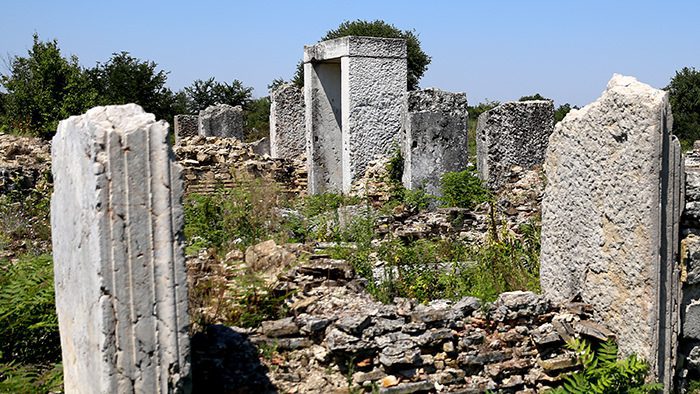
The ruins of the early Byzantine city of Nikopolis ad Istrum are situated just 20 kilometers from Veliko Tarnovo. The city was founded by Emperor Trajan in 106 A.D. and flourished until Attila’s Huns destroyed it in 447 A.D. The site is a fantastic example of Roman city planning. It had a network of streets, public buildings, a forum, public bath complex, odeon, and agora. There are information points throughout the site explaining the purpose of the ruins. Nikopolis ad Istrum was located at a major crossroads that linked several Roman provinces including modern-day Varna and Istanbul. Nikopolis as Istrum is open 9 a.m. to 6 p.m. April through October and 10 a.m. to 4 p.m. November through March. Admission is free!
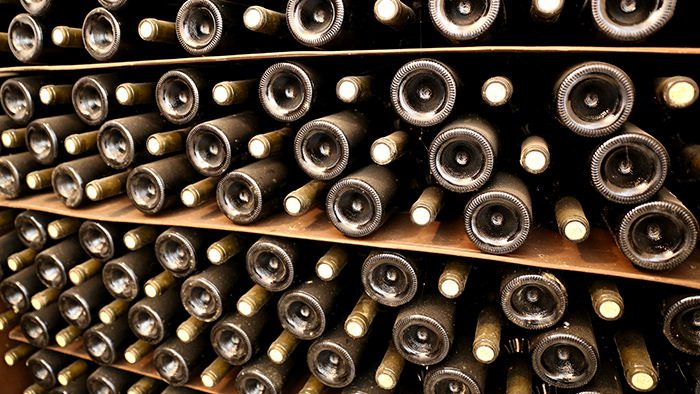
If wine tasting is your thing, head to one of the country’s best boutique wineries, Maryan Winery. Named after the nearby village of Maryan, the winery is owned and operated by Svetla and Ilia Ivanov, who in 2010 decided to take their love for wine to the next level. Their wines have already received a great deal of praise from the international wine community, and their Sense of Tears Rose won a silver medal in the Balkans International Wine Competition in 2012.
“The extraordinary story of the village dates back to the legend of the beautiful daughter of Tsar Ivan Alexander and the sister of Tsar Ivan Shishman – the last ruler of Bulgaria. The village is named after Kera Tamara (Mara) who was sent to become the wife of the Turkish sultan.”
The winery is situated in the village of Elena. It produces limited amounts of Savignon Blanc, Chardonnay, Rose, and other blends. To arrange a tasting, contact the winery directly at p.ivanov@maryanwinery.com or maryan.wines@gmail.com.

Despite its small size, Veliko Tarnovo has several hotels and hostels. We recommend Hotel Studio (Todor Lefterov 4) for its close proximity to Tsaravets Fortress and its rooftop deck with unobstructed views of the Tsaravets sound and light show. The hotel has four room types, free Wi-Fi, and free parking. The property has a summer garden, lobby bar, and an elegant dining space where the breakfast buffet is served. Ask for a room with a view at time of booking. Please note that the hotel does not have an elevator. Prices range from 76 to 111 BGN per night, depending on the room.

Just like the name suggests, Ego Pizzeria and Grill serves up crispy artisan pizzas baked in a wood-burning oven. Large, comfy booths make this place the perfect break from sightseeing. The menu also has salads, risottos, barbecued meats, and hearty sides. Prices are great at just 5 – 10 BGN per plate. Sit at the back of the restaurant for views of the river and old town.
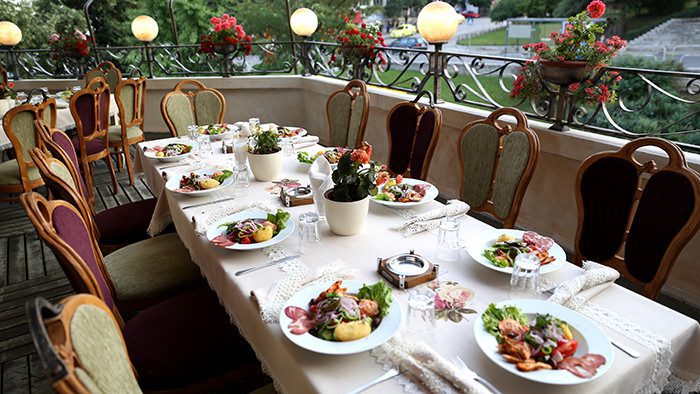
With multiple locations and an impeccable reputation for being one of the best restaurants in Bulgaria, Shtastliveca is ideal for any occasion. Now franchised, the Shtastliveca restaurants have managed to retain their quality and popularity. To-die-for salads, a variety of hot and cold appetizers, pizzas, juicy steaks, and traditional fare comprise the lengthy menu. Half portions are available. We dined at the main street location, but there are several more scattered throughout the city. Average price per plate is 5 – 15 BGN.
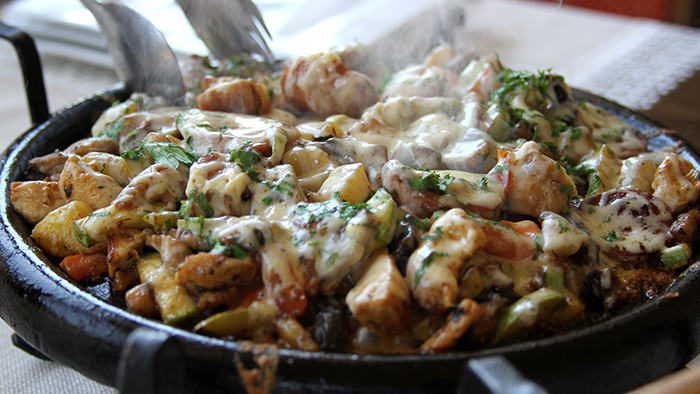
After exploring the Tsarevets Fortress, you’ll most likely be starving. Van Hassan II is located directly across the street from the fortress, making it a convenient lunch break option. If the heat of the day is making you weary, dine in the comfort of the restaurant’s air-conditioned dining room. The second floor has plenty of natural light and great views of the fortress. The restaurant offers a clean, family-friendly atmosphere and traditional Bulgarian specialties such as salads, soups, sach, grilled meats, and fish. Great for large groups and special events too. Average price per plate is 6 – 12 BGN.
Time zone: GMT +2
Electricity: 220-240 Volts. Electrical sockets take the European 2-pin round plug. For 110-120 V (U.S. and Canada) appliances, a plug adapter, and in some cases a voltage converter is required.
Currency: The national currency is the Bulgarian Lev, which is made up of 100 stotinki. The symbol for the Lev is “BGN”
Tip: Tipping 5 – 10% of the total bill is customary at bars and restaurants.
Before you go: Keep in mind that to see Veliko Tarnovo requires quite a bit of walking. The city was built on hills, so expect inclines and sore muscles after a couple days of sightseeing. For this reason it’s important to bring a good pair of walking shoes and avoid wearing flip-flops and high heels. Also note that Veliko Tarnovo is one of Bulgaria’s hottest cities. It is not uncommon for temperatures in August to reach in the upper 90s °F. Pack a hat, sunscreen, and drink plenty of water.
Have you been to Bulgaria before? Let us know your suggestions for what to see and do in Veliko Tarnovo! Leave a comment below!
Counter
101 Countries • 1432 Cities
sylvain verbeeck says:
Veliko Tarnovo is heaven; a wonderful place to stay, nice environment, old town and modern town together, beautiful parks and restaurants, bars, ….
Mirela says:
Wonderfull detailed article. 🙂
Shir says:
Hi there, thanks for this useful post! Do you know if there are any organized day trips from VT to near by nice places, as you mentioned?
I really don’t feel like renting a car there and I will be staying in VT for a while this July.
Thank you!
Alexandra says:
I’m so happy that you wrote about my country – Bulgaria. I’ve visited Veliko Tarnovo several times and just did also last summer. It’s beautiful, isn’t it? Love Shtastliveca restaurants, highly recommended 🙂
Stephen Blanchard says:
Hi .
I’ve bought a house in patresh. Is there much to do for young children in or around the village…..swimming pool etc..
Michael Fallas says:
I eat at Shtastliveca restaurant every time I am in VT and the food and atmosphere is fantastic though I prefer the original small one to the new one but the food and menu range is fantastic. Also the coffee place where you can sit overlooking the river with superb view (sorry can’t remember the name) not far from the Ego Pizzeria and about the same distance to the original Shtastliveca restaurant does my favourite hot chocolate drink with rum, ice cream and hot chocolate for around 3.6 leva.
David says:
Hi Michael thanks for stopping by and leaving a comment. Nice to hear that you also love Shtastliveca restaurant. It was definitely one of our favorites while we visited because of how much variety was on the menu.
Yoanna Boykovska says:
Deal David,
Great information! Thanks a lot! The photo of the Konstantzaliev’s house is a wrong one. The old houses in Arbanassi did not have such stone roots. Sadly, almost all houses have been destroeyed. My heart is there and it aches that we have lost such precious culture there.
Greetings
Greetings
Travel Guide | Travelguide says:
[…] Travel Guide to Veliko Tarnovo, Bulgaria: What to See and Do https://davidsbeenhere.com/As one of the oldest cities in Bulgaria, Veliko Tarnovo is steeped in five thousand years of history. This small, picturesque city is home to one of Europe's grandest medieval monuments, the Tsaravets Fortress. If you have … […]
Gareth Leonard says:
Excellent full coverage of a place I never even heard of. Eastern Europe is calling my attention more and more lately and I think it’s time I plan the trip. Thanks for the great info as per usual!
David says:
Thank you Gareth! Eastern Europe is still very authentic and relatively inexpensive compared to countries using the euro. Thanks for your comment and please let us know when and where you’re planning to go! Sounds very exciting.